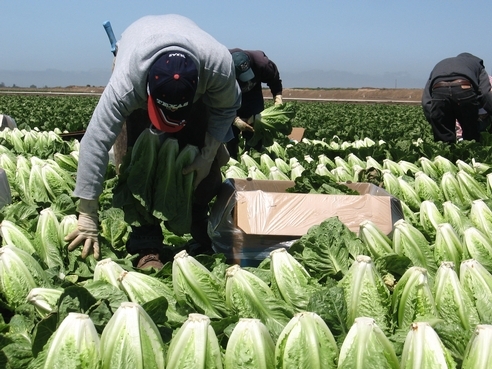- Author: Jeannette E. Warnert

“We want to introduce more farmers to these proven technologies,” said Jeff Mitchell, UCCE specialist in the Department of Plant Sciences at UC Davis and field day coordinator. “We’ve done research here, and there’s a lot of work from other areas showing that these systems work and they save water, reduce dust, store carbon in the soil and save farmers money.”
This year, the event has been expanded to include an afternoon bus tour to three San Joaquin Valley farms where conservation agriculture systems are already being successfully implemented. Registrants will gather at 1 p.m. at the UC Westside Research and Extension Center, 17353 West Oakland Ave., Five Points, to load the buses.
The farm tour visits:
- Johnny and Joann Tacharra Dairy in Burrel. The Tacharras will explain their plans to apply dairy waste water through an overhead irrigation system to grow forage crops.
- Armando Galvan of Five Points Ranch. Galvan will show how he refined his irrigation system to apply water to vegetable and row crops. Galvan installs special nozzles and boom configurations on his overhead irrigation drop lines that are designed to improve water infiltration and avoid ponding and crusting on the soil surface.
- Scott Schmidt of Farming ‘D’ Ranch in Five Points. Schmidt will discuss the new management strategies that must be applied to successfully implement new agricultural systems.
Following the tour, the participants reconvene at 4 p.m. at the UC Westside REC for a workshop on the economic and environmental benefits of conservation agriculture systems. The event continues with a free barbecue dinner, entertainment by the Wheelhouse Country Band and a keynote address by Suat Irmak, director of the Nebraska Water Center and professor of biological systems engineering. The Water Center was established at the University of Nebraska by congressional mandate in 1964. Nebraska farms currently lead the nation in adopting precision irrigation systems.
Following Irmak’s presentation and discussion, Mitchell will name the 2013 Conservation Tillage Farmer Innovator of the Year award winner.
The expanded event coincides with a concerted effort by the Conservation Agricultural Systems Innovation (CASI) Center to grow the conservation agriculture movement in California. CASI is a diverse group of UC researchers, farmers, public and private industry and environmental groups formed to develop and exchange information on sustainable agricultural systems for California row crops.
“In each century, there are just a handful of times when agriculture can transform itself in revolutionary ways,” Mitchell said. “There is growing evidence that today presents one of those rare chances for agriculture in the San Joaquin Valley to reinvent itself.”
The event is free but pre-registration is requested to help with planning for the bus tour and dinner. Please R.S.V.P. by email to Diana Nix at dlnix@ucdavis.edu or by completing the online survey.
- Posted By: Sandra Willard
- Written by: Eve Hightower, (530) 752-8664, ehightower@ucdavis.edu

“A sustainable food system is healthy and safe for everyone, including all those who work the land,” said Tom Tomich, director of SAREP. “As SAREP continues to support sustainable agriculture research, we look forward to identifying research opportunities that will improve farmworker conditions.”
California farmworkers face many challenges at work and in their communities. Nearly a quarter of California farmworker families live in poverty, according to the U.S. Department of Labor. While farmworkers play a crucial role in feeding Californians, food insecurity is among the many challenges they face daily. Farm work is one of the most hazardous occupations in the state, but nearly 70 percent of California farmworkers have no health insurance, according to a California Institute for Rural Studies report.
SAREP aims to help researchers add context to these numbers by interviewing members of organizations that work with farmworkers and other stakeholders. Participants will be asked to suggest the types of research, education and communication projects they would find most helpful as they work to improve farm laborers’ working and living conditions. The research agenda is scheduled to be completed by September 2012.
“Projects such as this – creating a research agenda with the participation of people who will ultimately use the information for their work – is inspired by the University of California’s land grant mission to serve society,” said Gail Feenstra, SAREP food systems coordinator. “SAREP was founded to help ensure all California agricultural interests, particularly the underserved voices, are supported through scientific research, education and outreach.”
Research regarding California farmworker issues has been conducted, but there is more to do. SAREP aims to assist both researchers and farmworkers by identifying research that workers and community organizations would find most useful.
In addition to identifying research topics, key stakeholders and potential partners and funders, SAREP is forming an advisory committee to guide its farmworker research and outreach efforts.
SAREP provides leadership and support for scientific research and education in agricultural and food systems that are economically viable, conserve natural resources and biodiversity, and enhance the quality of life in the state's communities.
# # #
Media contact: Gail Feenstra, (530) 752-8408, gwfeenstra@ucdavis.edu.


